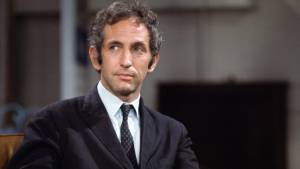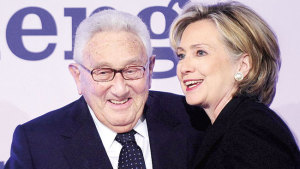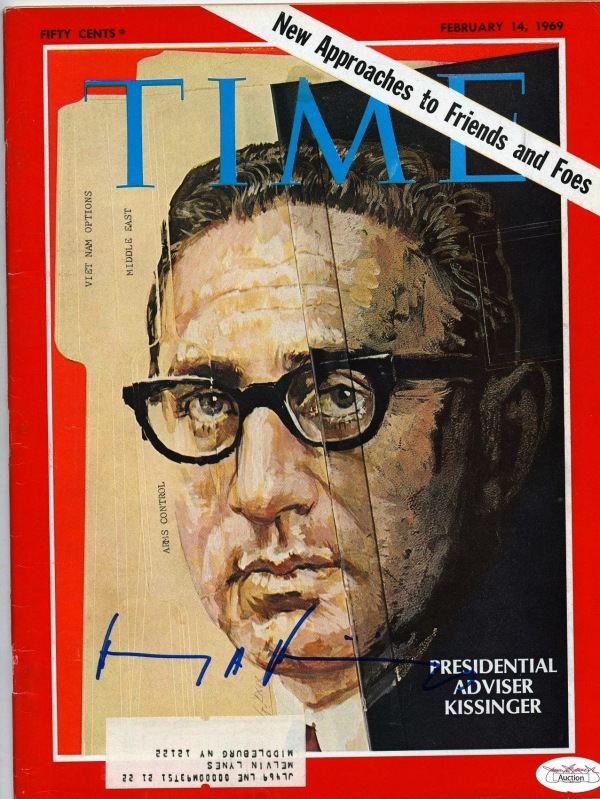DANIEL ELLSBERG [PICTURED, BELOW RIGHT]: I have a very strong feeling that Nixon and Kissinger are similar personalities and feel a great affinity and attraction. Each of them may be the other’s best friend, at least during business hours. Kissinger – and surely Nixon, too – has a very strong ideological belief in the efficacy and legitimacy of the threat of violence as a tool of power and as a way of “establishing world order.”
One can guess – and I’m neither a psychiatrist nor a producer of official psychological profiles – that Nixon and Kissinger are people who have very strong desires not only to threaten, but to inflict violence. Kissinger can’t be a rebel, he couldn’t conceive of taking part in violence directed against “authority”; but by all evidence he wants very much to be a party to violence. There’s no question that he likes to issue threats. I would suspect very strongly that he wants some of his threats to fail, so that they have to be carried out.
After Cambodia and Laos, I’ve always privately thought of Henry Kissinger as a murderer. We’re not talking of persons who burglarize this or that  office, but of persons who dropped four million tons of bombs on Indochina. Words are hardly adequate to define people who took those choices and took them in the years 1969 to 1972. They were not confronting Joseph Stalin or Adolf Hitler, nor did they act under whatever misconceptions about Ho Chi Minh may have lingered in the late Fifties or early Sixties. They took those decisions after Lyndon Johnson and Robert MacNamara themselves dropped two million tons, failed, and were thrown out of office; they proceeded to drop four million more tons after 1969, having been elected mostly by people who expected them to end the war. […]
office, but of persons who dropped four million tons of bombs on Indochina. Words are hardly adequate to define people who took those choices and took them in the years 1969 to 1972. They were not confronting Joseph Stalin or Adolf Hitler, nor did they act under whatever misconceptions about Ho Chi Minh may have lingered in the late Fifties or early Sixties. They took those decisions after Lyndon Johnson and Robert MacNamara themselves dropped two million tons, failed, and were thrown out of office; they proceeded to drop four million more tons after 1969, having been elected mostly by people who expected them to end the war. […]
Finally we saw Kissinger for lunch on a little patio. General Haig was at the table. As we all said hello, Kissinger, in his usual fashion, turned to my friend and said, “You know, I have learned more from Dan Ellsberg…” and I thought he was going to repeat his statement about Vietnam, but he seemed to hesitate, and then said, “about bargaining than from any other person.”
I was taken aback. I didn’t know what he was referring to, although my academic specialty had been “bargaining theory.” And suddenly I remembered that 11 years earlier when I had given a series of talks on “The Art of Coercion,” I had also given a couple of those lectures to Kissinger’s seminar at Harvard. “You have a very good memory,” I said. And he replied, “They were good lectures.”
When I rethought that incident later, it made the hair on the back of my neck stand up. The lectures I had given had to do with Hitler’s blackmail of Austria and Czechoslovakia in the late Thirties, which had allowed him to take over those countries just by threatening their destruction. One of those lectures was “The Theory and Practice of Blackmail.” And another was called, “The Political Uses of Madness.”
News leaks about the Cambodian invasion, obviously coming from off-the-record backgrounders by Kissinger, had revealed a major motive of the invasion was to convince the Russians and the Chinese that our decision-making was unpredictable, and that since we could do something so apparently unpredictable and crazy as invade Cambodia, they could not count on our reasonableness or prudence in a crisis.That was Hitler’s conscious policy: the threat of unpredictability. I had described it in my lectures as being a possibly effective, but extremely dangerous strategy. It was a commitment to madness. MORE
THE NATION: Word comes from Politico that Hillary Clinton is courting the endorsement of Henry Kissinger. No surprise. Kissinger and the  Clintons go back a ways, to when Bill in the early 1990s sought out Kissinger’s support to pass NAFTA and to, in the words of the economist Jeff Faux, serve as “the perfect tutor for a new Democratic president trying to convince Republicans and their business allies that they could count on him to champion Reagan’s vision.” Hillary has continued the apprenticeship, soliciting Kissinger’s advice and calling him “friend.”
Clintons go back a ways, to when Bill in the early 1990s sought out Kissinger’s support to pass NAFTA and to, in the words of the economist Jeff Faux, serve as “the perfect tutor for a new Democratic president trying to convince Republicans and their business allies that they could count on him to champion Reagan’s vision.” Hillary has continued the apprenticeship, soliciting Kissinger’s advice and calling him “friend.”
Still, Bernie Sanders, and Sanders supporters and surrogates, should use the Politico story to draw a line, making clear that they will withdraw their support of Clinton if Clinton accepts Kissinger’s endorsement. If Sanders stands for anything, it is the promise of decency and civil equality, qualities that he has worked hard to bestow on Clinton since the Democratic National Convention. By accepting Kissinger’s endorsement, Clinton wouldn’t just be mocking that gift. She’d be sending the clearest signal yet to grassroots peace and social-justice Democrats that her presidency wouldn’t be a “popular front” against Trumpian fascism. It would be bloody business as usual.
Kissinger is a unique monster. He stands not as a bulwark against Donald Trump’s feared recklessness and immorality but as his progenitor. As Richard Nixon’s aide-de-camp, Kissinger helped plan and execute a murderous, illegal foreign policy—in Southeast and South Asia, Southern Africa, the Middle East, and Latin America—as reckless and immoral as anything Trump now portends. Millions died as a result of his actions. Kissinger and Nixon threatened to use nuclear weapons, and, indeed, Kissinger helped inscribe the threat of “limited nuclear war” into doctrine. Kissinger, in the 1970s, not only dug the hole that the greater Middle East finds itself in, but, as an influential cheerleader for both the first Gulf War in 1991 and its 2003 sequel, helped drive the United States into that ditch.
Kissinger’s crimes aren’t just related to covert murder, genocide, and illegal bombing. In 1975, for example, as Gerald Ford’s secretary of state, he helped Union Carbide set up its chemical plant in Bhopal, India, working with the Indian government and helping secure a loan from the Export-Import Bank of the United States to cover a portion of the plant’s construction. Then, after the plant’s 1984 chemical-leak disaster, Kissinger Associates, the consultancy firm he set up after leaving the State Department, represented Union Carbide, helping to broker, in 1989, a $470 million out-of-court settlement for victims of the spill. The payout was widely condemned as paltry in relation to the scale of the disaster: The spill caused nearly 4,000 immediate deaths and exposed another half a million people to toxic gases. Kissinger Associates is a private company—Kissinger famously quit as chair of the 9/11 Commission so he wouldn’t have to reveal his client list—so the fees it extracted from Union Carbide for this service is unknown. But Bhopal is a good example of the way Kissinger, as a private consultant, profited from the work he did as a public servant (for Kissinger’s role in negotiating the settlement, see the 1988 letter obtained by the environmental reporter Rob Edwards, found here; also, see New York Times reports that Kissinger’s firm had an account with Union Carbide). MORE

